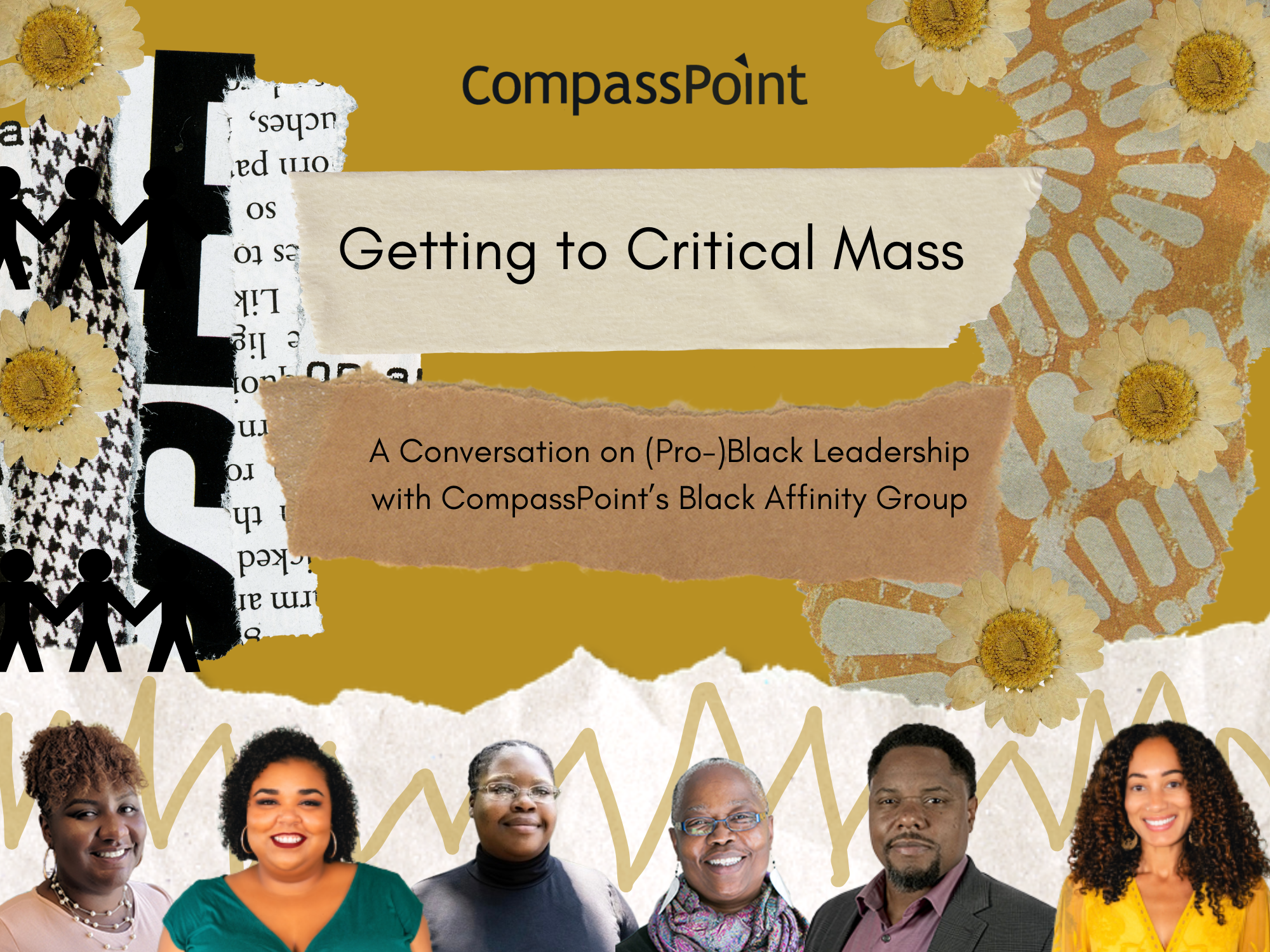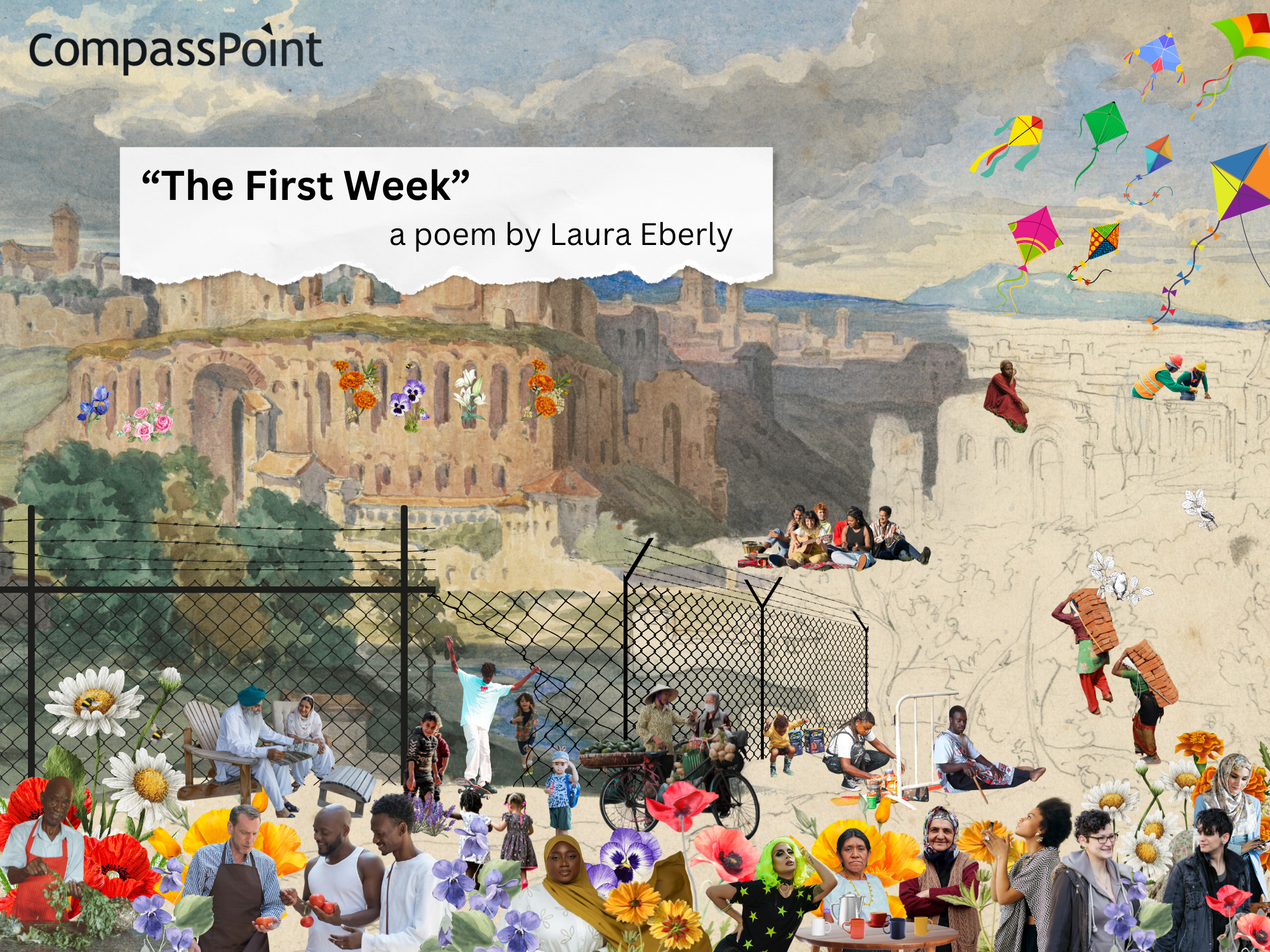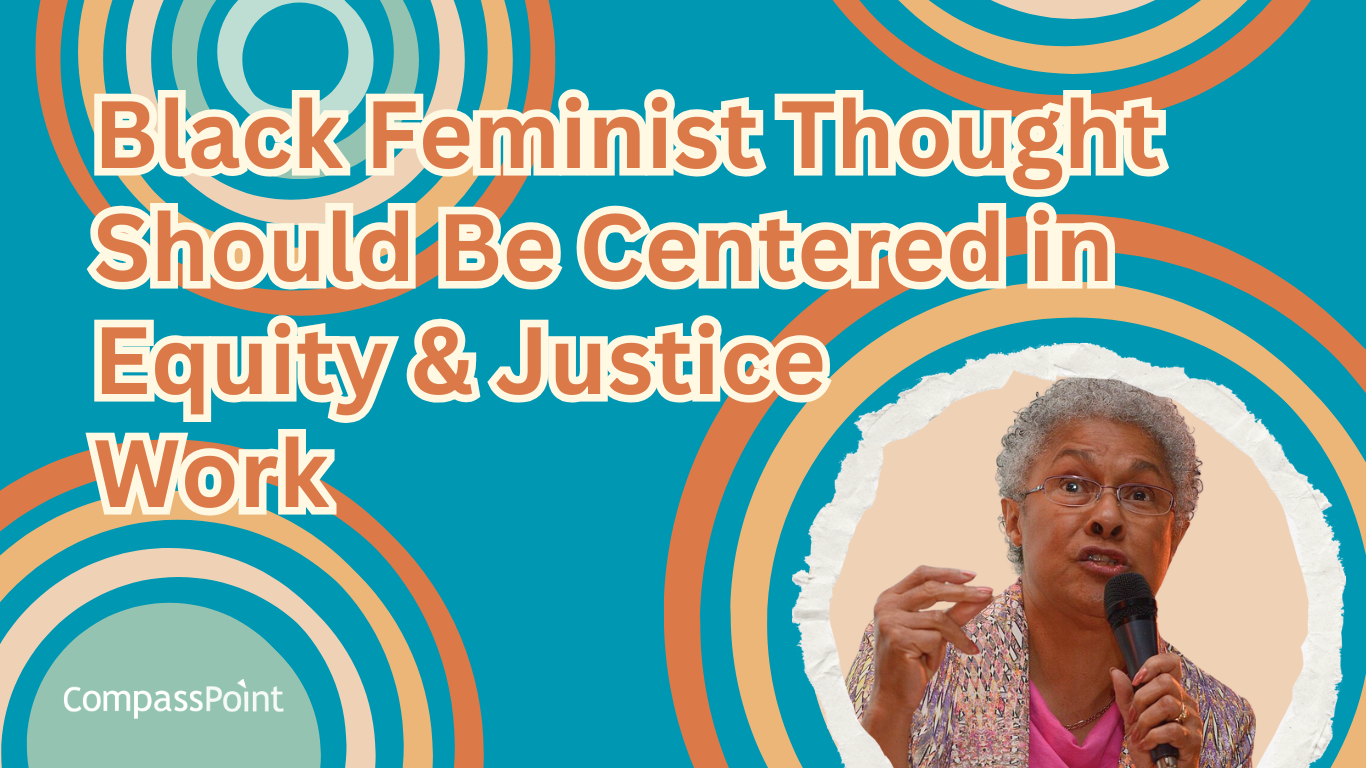[Image description: A vibrant black and gold art collage with various patterns, random text, and images of dried sunflowers styled as paper cutouts. At the top is CompassPoint’s logo, followed by the heading “Getting to Critical Mass” and the subheading “A Conversation on (Pro-)Black Leadership with CompassPoint’s Black Affinity Group.” At the bottom of the image are six vibrant, smiling Black people who make up CompassPoint’s Black affinity group.]
Collage art by Learkana Chong
CompassPoint’s Black affinity group members convened for their first publicized dialogue about (pro-)Black leadership: what it means, why it matters, and how our organization is deepening our commitment to it.
(Please note: The following conversation took place at the end of September 2024. While it does not take into account the current presidential administration, the topics addressed remain timely. This conversation has been condensed and edited for clarity.)
by Kyla Hartsfield, Jasmine Hall, spring opara, Maryssa Hall, Joe Jackson, and Simone Thelemaque
“I have come to believe over and over again that what is most important to me must be spoken, made verbal and shared, even at the risk of having it bruised or misunderstood. That the speaking profits me, beyond any other effect.”
– Audre Lorde, “The Transformation of Silence Into Language and Action”
On what being a Black leader means in this time
Kyla: It is an honor to step into leadership. It is my duty. Nobody is free until we're all free, and Black people are not free right now. So whatever I can do to help us get free, and to liberate us, I step into that. In 2016, members of Black Lives Matter, Atlanta, brought a mandate for Black people. And in that mandate, it says that our duty is to avenge the suffering of our ancestors, and to earn the respect of future generations. And to be willing to be transformed in the service of the work. So me not being a Black leader is just me being untouched. I am constantly transformed by the work I am putting in, and have grown into the person that will make little Kyla proud. And I really wanna make all my future generations who don't know of me yet proud, as well as my ancestors.
spring: Being a Black leader to me during this time, it really means walking in integrity. It means being creative. It means that I'm clearing the road for the seven generations behind me, and honoring the seven generations that came before me. In the area of being a creative leader, I think it's important during this time, because I’m not replicating the leadership that is already in existence. And so if I'm not gonna replicate it, that means that I have to try and fail, try and fail. And my main stance in standing in my integrity is ensuring that when I'm working with seasoned leaders or emerging leaders that we're talking about the humanity, that we're talking about the things that disrupt and eventually dismantle the system. So I'm trying to get us, honestly, to critical mass.
Joe: A Black leader to me is a Black person who can articulate a vision and inspire others to action. But doing that in service of getting to those end goals. This is a person who's gonna be adaptive, flexible, passionate about getting to that vision. But most of all they're gonna hold a lot of empathy. They're gonna constantly remember that they're working with folks, not over folks, or around folks or behind folks, but with people.
Jas: So I will say that my journey as a leader has its gifts, its hurdles, and its burdens, right? I think I was very fortunate to spend most of my time growing in my leadership in one place here at CompassPoint. I've been here for eight and a half years, and I've literally grown here. This has been the training ground for me. Some of the gifts that I think I received from CompassPoint was being able to work alongside y'all, and many others, some beautiful minds, some soulful beings. And be a part of an organization that was really committed to visibilizing what was often invisible.
This other piece is important to say, the importance of introspection and self-awareness, and how much along this journey I had to, you know, reprogram my nervous system, and root out some of the old beliefs that blocked me from being able to stand in my power. When I'm assimilated and trying to fit in and dim in my light, and when I am bringing authentic Jas.
I remember, early in my time at CompassPoint, having a conversation about how I felt like I was navigating two different worlds, where I needed to take on two different identities to operate in downtown Oakland, and then to operate in East Oakland, where I was born and raised, and Lake Merritt would be my dressing room, where I would take off the suit, and be normal Jas, then put that suit back on, and be “Professional Jas.”
And how dehumanizing that felt, that I couldn't navigate in certain arenas [while] being able to show up authentically as me. Which is why I show up authentically as Jas in every space that I'm in.
Simone: My experience as a Black leader has been a journey. There have been lots of imposter syndrome, lots of doubting myself, and whether or not I am a “Leader.” And over time, especially after becoming a parent. I realized that I don't have the luxury to avoid the discomfort that comes with putting myself out there. And at some point I was able to connect with other Black folks, be in other Black spaces and community spaces where I was able to learn and able to witness so many different leadership styles. And this was a game changer for me. It was such a joyful and affirming revelation to see that awkward, introverted, quirky, karaoke-loving Black folks are also leaders. And so my experiences are reminding me how important representation is. Representation matters. And my journey has meant that I am becoming uniquely Simone.
Being a Black leader doesn't imply any particular disposition, or temperament. Also, being a leader doesn't require that I'm the one on the microphone or carrying the bullhorn, or in the front. Because I love operations. I love being behind the scenes, and this is my style of leadership, and it's so needed. My experience has also meant that I've had to learn to not only be comfortable, but thankful for critical feedback of my leadership. My experience has meant that I'm having to learn to practice what I preach. I'm having to learn that I can't skip over the important work of self-reflection.
On the contradiction of “We’re constantly showing up for other folks, but who’s showing up for us?”
Joe: Yeah, I think about this question a lot, because, you know, I'm a Black trans dude running around here trying to get us all free. But I frequently end up in conversations, or just overhearing, or, you know, reading comments, some incredibly insensitive and transphobic stuff. I can't even point to one thing. It’s everywhere all the time. And it's often coming from folks who will bring attention to other injustices in the world, especially those of us who are Black, right? Sometimes it can be feeling like, ‘Well, dang, you know I'm out here, I'm for your freedom, but you down for me?’ You know what I mean? Like can I even tell you who I am?
But when I think about it, I think about all the people who are out here doing good work. Right? So I try to imagine a world where people are invested in, at heart, that you okay, and I'm okay, and we ain't got to hurt one another to be okay. That's the world some of us are fighting for, and when I think about those people, those are the spaces where people do show up for me and other Black trans folks, and are investing capital, investing time, investing their emotional energy. And then I just have to remember those people and focus on those folks. But sometimes, the nasty is a lot louder than the nice.
Maryssa: When I think about the contradiction of constantly showing up for other folks and not always feeling as if folks are showing up for us, besides us, the first thing that comes to mind is the reminder and the truth that I don't show up in solidarity of others for transactional purposes. I know that our collective liberation requires us to be in solidarity with one another. And that doesn't make it any less painful, when folks we show up for don't show up for us, when they don't protect us. When they don't have our backs. It doesn't make it any less painful when we are invisibilized.
There is a reason that the #SayHerName movement was created as a response to the invisibilizing of Black women who were also being murdered at the hands of police brutality and anti-Black violence. Because we need to be seen, we need to be heard. We need to also be cared for and held in the way that we are doing that for others. There's a reason that intersectionality was created to visibilize the way Black women experience different systems of oppression as both Black people and as women. And the creation of intersectionality has continued to be a tremendous tool for analyzing how power is distributed and how it shapes inequality for even more intersecting identities, including sexuality, class, citizenship.
We time and time again create something beautiful that benefits not just us, but folks outside of us. And we're gonna keep doing that. I know that we're going to continue showing up and speaking out. Because at the end of the day, we are not new to this. We are true to this, and we're gonna keep on keeping on.
On ways non-Black accomplices can show up for Black leaders
Maryssa: Some of the ways that folks can show up for us are checking on us. Do not fall for the myth that we do not need support, or that we can do it all alone. It looks like holding space for us. Space to be vulnerable, space to be free, space to be frustrated, space to have righteous anger, space for us to just be. It looks like respecting us, including our leadership, our contributions, our humanity. It looks like holding grace for us. And working alongside us.
And above all, I want to name that what looks like showing up for me might not look the same for every other Black person. So please ask us how you can support us, be in dialogue with us and in relationship. Sometimes that answer is, ‘I don't know. I don't know how to support me,’ and that doesn't mean that you can't still keep asking. But sometimes it might not be a question that we get asked a lot, and having someone showing up and saying that they're here to support us—eventually I might trust that I can actually let you know what I do need. So don't be deterred and continue showing up.
spring: Ask us what we need, and then listen to what we say. Because you can ask, but if you're not listening, even if it's ‘I don't know, I'm feeling some kind of way.’ Let us sit with ‘I don't know, I'm feeling some kind of way,’ and then ask, ‘Should I tap back in? Will you come to me?’ I think the first step that everybody can take is listening to Black folks when we talk. We are at the margin of this. Anti-Blackness is woven into the fabric of the American society. So when we tell y'all some shit is askew, trust us, at least 65%, that is askew. And that the thing we tell you will fix it, will fix it. And so the last thing I'll say is to our allies: We don't need allies. We need accomplices.
We need y'all to put y’all bodies in front of our bodies. We need y'all to start paving some way, laying some ground, doing some work. We're past “The Ally”—’Oh, kumbaya!’ And quoting MLK, we need y'all now to get into them chambers of the judges. Get into the Congress and vote for some different folks who, you know, will support our transformation and stop holding onto this illusion of whiteness. It just don't exist. It's an illusion, and they keep us in that illusion so that y'all won't partner with us. Notice how I said that, partner with us. To dismantle these systems. So we don't need no allies. We need accomplices. We need people who ain't new to this, but true to this, as Maryssa said.
On why CompassPoint is investing in (pro-)Black leadership
Jas: One of the biggest reasons is because we believe that there's still work to be done. We're still navigating anti-Blackness in our workplaces, in our country, in the world. We still need to address the injustices and oppression Black people face, from pay disparities to glass cliff conditions, to policing Black and brown bodies through the white standard, aka “professionalism.” And we must continue to invest in cultivating Black leaders by starting with ourselves.
Also, we are seeing a drastic decline in the funding for pro-Black efforts in 2024, in comparison to the influx in 2020. And specifically in 2020 and 2021 around the uprisings from George Floyd's murder and Breonna Taylor's murder, and many others who have been murdered in that period. And right now we're also seeing a lot of organizations backtrack and question whether DEI is effective, and choosing not to prioritize equity, power building, and creating psychologically safe work environments for Black and Indigenous, People of Color leaders. Recognizing that these lack of resources exist—time, energy, money, etc. is being pulled out of these efforts—makes it even more challenging to do this work, and for the reasons that I named earlier, makes it imperative that we continue to invest in Black leaders.
Maryssa: We are committed to being a space for Black leaders, where we can grow, where we can learn and unlearn and do that work. A space for Black leaders to come and be able to grapple with the moment of our movements, the moment of our organizations, the moments of our lives. And we're committed to being a space where Black folks can thrive. CompassPoint has existed for 50 plus years. We have been serving the nonprofit sector for five decades. We have the history, we have the resources—I'm not just saying financial. I'm saying the relationships, I'm saying the learnings. We have the ability to really pour into the Black community. And we’ve made that commitment. And we’ll continue making that commitment because Black folks need, and Black folks deserve, a space to be and a space to dream of the world that we want to live in.
Simone: For those who are maybe new—CompassPoint is an organization with shared leadership. This is an organization where the voices of all staff matter. We have input to a lot of decisions around our programs and such. And so we're investing in Black leadership at this time, because we want to! And we can. [laughs] And I would also just offer that if you want to, you can, too.
On what CompassPoint has been doing to deepen our pro-Black commitment
Jas: When I joined CompassPoint eight and a half years ago, we had a commitment to racial justice. Right? We were coming out of multiculturalism and racial justice, and over the years of being at CompassPoint, we landed solidly in a pro-Black commitment. Some of the work that I contributed to on various teams, some with spring included as a long-timer here at CompassPoint, is busting that glass ceiling that existed between our Associate Project Director position and our Project Director position that limited Black folks from being able to access formal leadership in positional power at CompassPoint. And so I'm looking at the screen right now, and I'm getting chills because everybody I'm looking at is Black, and everybody I'm looking at are also Project Director staff—like, how many of us got through the door by the support and the scaffolding that CompassPoint offered us, to be able to do this magical work we call pro-Black work at this organization.
Kyla: Yeah, I would be remiss to not give a thank you to Jas, spring, Simone, as well as all of the Black people at CompassPoint who had a way in making it easier for me to be here. I don't know your name. You might not know my name, and I'm giving a bunch of thank-yous, as well as I'm thinking about how I'm making it easier for Black people after me to be in leadership and to continue busting glass ceilings.
Jas: Another thing that I'll add. So right now we are working with the National Equity Project, the Black Teacher Project in particular—shoutout to Micia Mosley, Woo Williams, and Joseph Edelin for the work that they've done in helping us identify our North Star [guiding principles for Pro-Blackness]. And our North Star is not only going to be applied to how CompassPoint shows up as a pro-Black workplace, but also how CompassPoint is gonna show up as a pro-Black organization supporting other organizations as they navigate their journey to pro-Blackness.
So of course, we are cooking up some fresh, new content focused on developing leaders, developing Black leaders in particular and also developing our Indigenous, People of Color leaders, and our white accomplices as well. Recognizing that we have general spaces where everyone can participate in our programs and inviting folks to go on this experience with us from a pro-Black lens, right? So this work is not only happening for Black leaders, it's happening for all leaders who are committed to pro-Blackness.
[Spotlight: CompassPoint Black-Led Programs and Services]
Building Equitable & Just Organizations Through Individual & Relational Practices
Wednesdays 3/5, 3/12, 3/19, 3/26 | 9:30am-1pm
Joe: This is for anybody who is ready to do that work. But, this workshop is about the individual work, right? You may not have the decision-making power in your organization to implement policies and procedures, and change systems, but each and every one of us can govern our own conduct.
So this workshop is about getting real deep, thinking about where our opportunities lie, and how we show up, how we treat ourselves and other people, how to do the critical self-reflection. How to think about and center the relationships we're in as a site and a source for equity and justice, and to give you some frameworks for thinking about that, and then to give you some time to reflect on the practical things that you think will support that effort. So this is what we're bringing online and hope that it supports everyone in doing the equity and justice work in their workplaces.
‘How You Be?’: Radical Visioning as Black Leaders
Fridays 4/4, 4/11, 4/25 | 9:30am-12:30pm
This learning series provides the time, spaciousness, peer support, and resources for Black people in leadership to grow their creativity and vision in order to reground in their purpose and increase their transformative impact on the organizations, communities, and movements they lead.
spring: So the ‘How You Be?’ Radical Visioning as Black Leaders is coming online. Me, Kyla, and Maryssa are your team, so we would really invite you all to come and sit in the rooms with us. We got something for y'all. Y’all ain’t ready, y’all ain’t ready.
Joe: I work with the philosophy that if we can improve conditions for Black people in their workplaces, then we're gonna improve experiences and conditions for everyone else. With that in mind, we have our capacity building and consulting team that we've gotten started. And this is for organizations who wanna deepen their pro-Black work and their work to do workplace justice and equity. We can support in a variety of ways; we can offer mediation, we can offer an assessment to figure out where your opportunities lie to advance that work, we can work with you all to facilitate courageous conversations, we can bring in-house workshops to your organization.
For more updates on upcoming pro-Black, Black-led, and Black-only offerings, check out our Workshops page, our New Programs and Events page, or join our mailing list.






Submit a comment